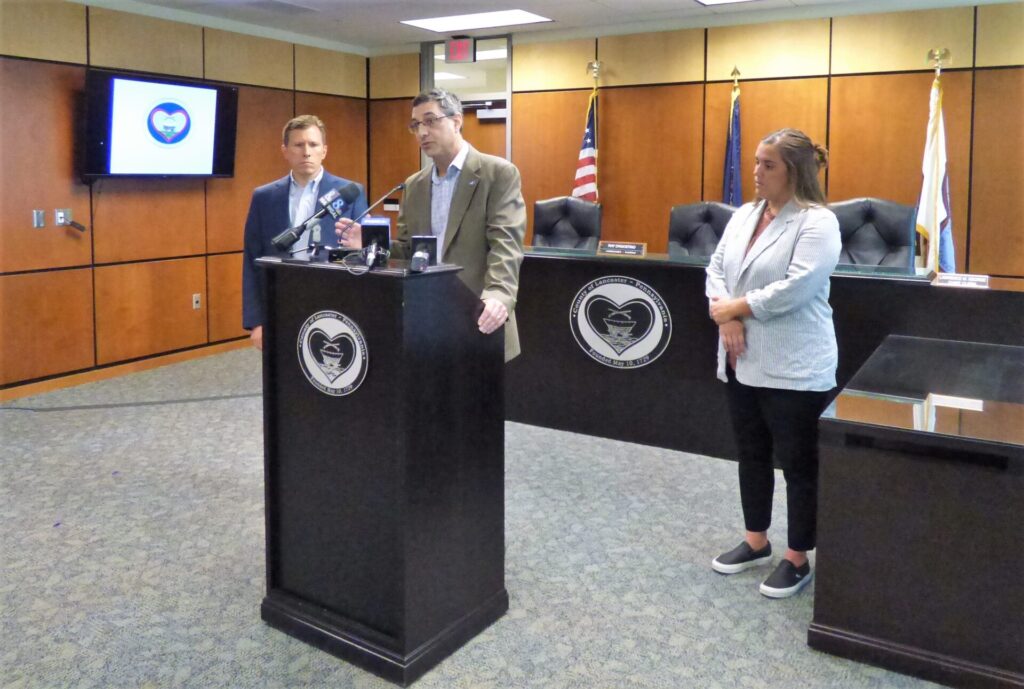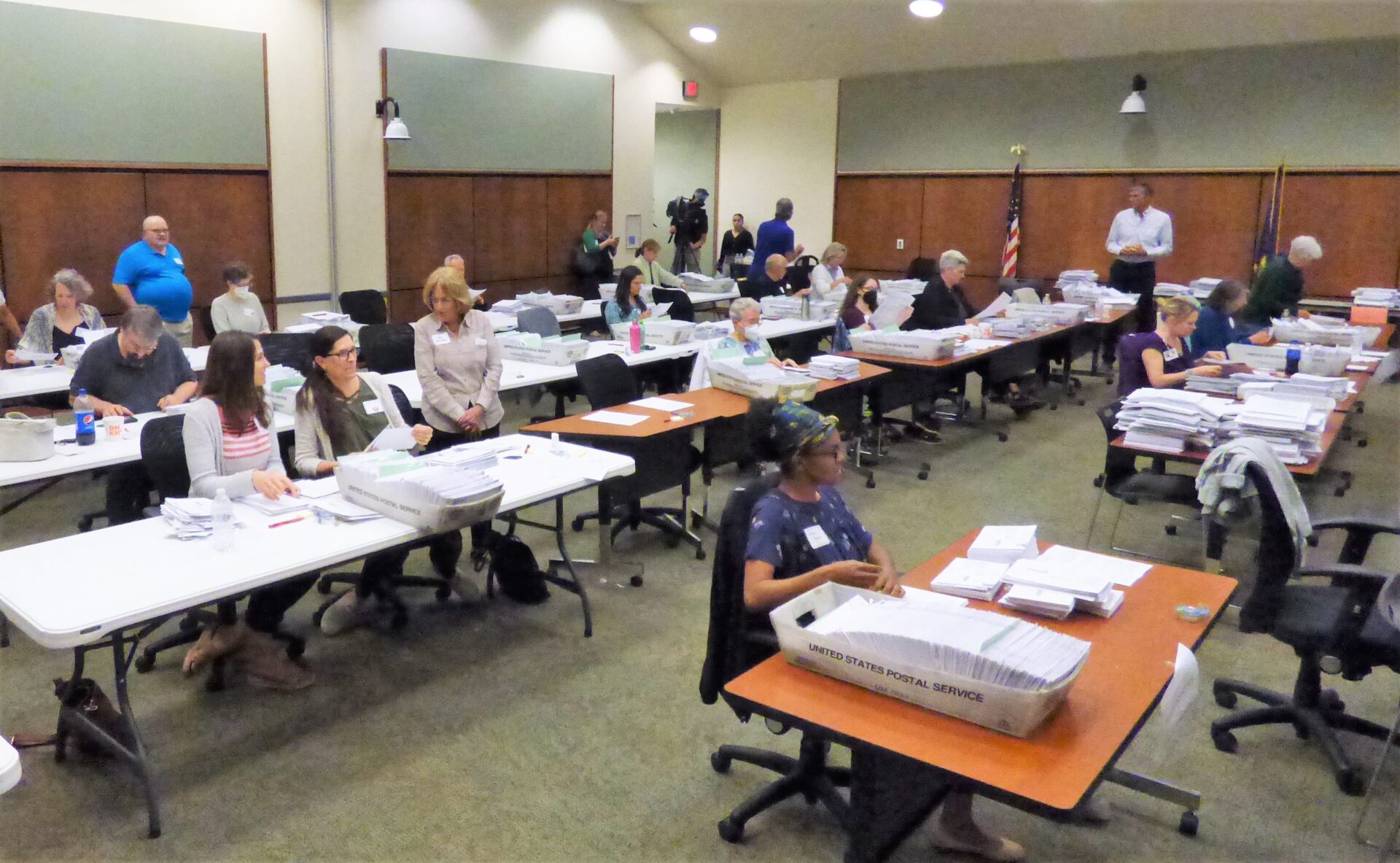Lancaster County will apply for state funding to help it administer elections, and it will stick with its existing election vendor despite a problem with misprinted ballots in the spring primary that necessitated a time-consuming and expensive re-marking process.
Those decisions were reached at Wednesday’s Election Board meeting, during which the county’s two Republican commissioners reiterated their vehement opposition to Act 77, the law that authorizes broad-based voting by mail.
Act 77 is unconstitutional and “a huge logistical nightmare,” Commissioner Josh Parsons said. It has saddled counties with unworkable procedures and deadlines, complicated by Department of State directives that flout the law’s text, he and Commissioner Ray D’Agostino said.
Allowing pre-canvassing — preparing mail ballots for counting prior to Election Day — would help, but it wouldn’t fix Act 77’s procedural and constitutional flaws, they said.
Commissioner John Trescot, the board’s lone Democrat, said he likes the convenience of mail-in voting, and that with pre-canvassing and other technical fixes, Act 77 could be perfectly workable.
Act 77 was passed by a bipartisan vote in Pennsylvania’s Republican-majority legislature and signed into law by Gov. Wolf in 2019. Republicans subsequently attacked mail voting nationwide in 2020 and thereafter.
Earlier this year, the state Commonwealth Court ruled that Act 77 violates Pennsylvania’s constitution. The matter is before the state Supreme Court; Act 77 remains in force in the interim.
Act 88
The state funding the county is seeking was authorized by Act 88, which bans outside groups from funding elections. Recognizing the burden on counties, it provides $45 million to them statewide for election operations and infrastructure.
Act 88 could have included pre-canvassing, too, Trescot said, and he said he’s “amazed” that it didn’t, given how strongly county election officials across the state have pleaded for it.
Lancaster County’s share of the funding is expected to be about $1.78 million, based on a formula of roughly $5.15 per registered voter, Chief Elections Clerk Christa Miller said. That works out to a little over 60% of her department’s $2.9 million budget for 2022.
The money can be used to support a wide range of election expenses. It will be a huge help, Miller said.
The money comes with strings, including requirements that counties start pre-canvassing at 7 a.m. on Election Day, that they count ballots without interruption 24/7 until the job is done; and that they post the number of ballots they have received as of the end of Election Day.
That last requirement is likely to sow suspicion, the commissioners said: The number of ballots received will continue to change as military and overseas ballots arrive; moreover, some ballots will be invalid for one reason or another and not be counted.
Miller said her office is studying how best to present the data to forestall misunderstandings.
Even with the added resources, it’s unlikely the elections office will be able to provide results by the close of Election Day, due to the sheer number of mail-in ballots, Miller said. Election-night results used to be routine, and it’s a shame that they no longer are, Parsons said.
Assuming state funding for elections remains available annually, it may be possible to reduce the county’s share of the election bureau’s funding, the commissioners said. The issue will certainly be looked at during budget season, Trescot said.

Election vendor NPC
Meanwhile, Miller recommended sticking with election vendor NPC, despite the May primary’s printing error, because of the company’s willingness to take responsibility for the mistake and go the extra mile to rectify it.
The company has worked collaboratively with county staff to implement additional safeguards, which are in the process of being formalized in a revised contract, Miller and county Solicitor Jackie Pfursich said. Once it’s drafted, it will be brought to the commissioners for approval, Pfursich said; NPC’s compensation is not expected to change.
The remarking cost about $18,300, Miller said. After adjusting for money the county owes NPC, the balance due to the county for the error is $6,224. NPC is willing to cut a check, Miller said, and the commissioners agreed that would be the best way to close out the issue.
As for sticking with NPC as a vendor, Trescot said he was impressed by the company’s responsiveness both on Election Day and thereafter. Mistakes are always a possibility, but NPC’s attitude “says to me they’re a good vendor,” he said.
Parsons said the county is in a “bind”: There are a limited number of qualified election vendors, and the county has already switched once before, choosing NPC after a bad experience with another vendor, Plerus, misprinted ballots in 2021.
“I trust your recommendation,” he told Miller. But given the complexity of elections in Pennsylvania, where ballots can sometimes differ from precinct to precinct, and the shortcomings of Act 77, there will continue to be election problems for the foreseeable future.
“I don’t want it to be us ever again,” he said.






